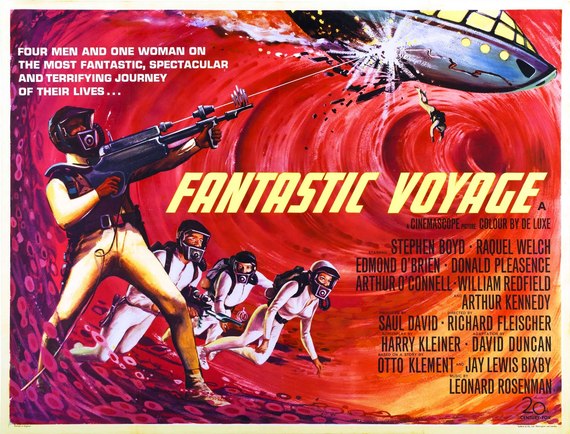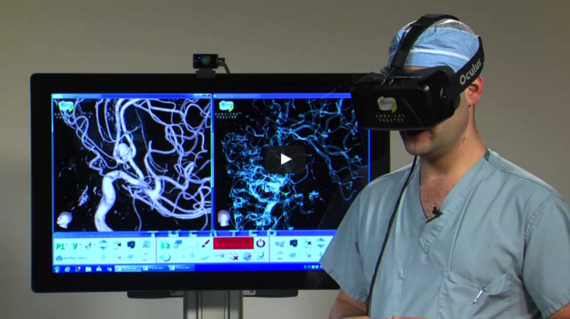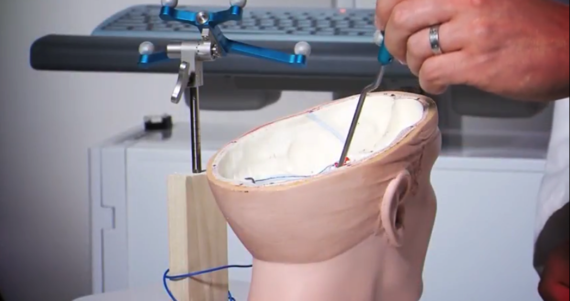The thing about science fiction is - often it comes true. Back in 1966 writer, Harry Kleiner penned a wildly futuristic film fantasy called Fantastic Voyage. In it, a submarine crew is shrunk to microscopic size and venture into the body of an injured scientist to repair the damage to his brain. I wonder if Dr. Neil Martin has seen the film? In some ways, it hardly matters, since he's starring in a VR experience that turns the film's fantasy into reality.
Dr. Martin is the chair of neurosurgery at UCLA. Dr. Martin and his team are working with a technology developed by a company called Surgical Theater to use VR headsets to let surgeons to journey inside their patients' brains. By using a VR environment to explore a malignant tumor in the patient's brain, doctors are able to "fly around" the tumor, see it from all sides, spot potential complications, and mentally prepare for the high-stakes operation.
The thing about science fiction is - often it comes true. Back in 1966 writer, Harry Kleiner penned a wildly futuristic film fantasy called Fantastic Voyage. In it, a submarine crew is shrunk to microscopic size and venture into the body of an injured scientist to repair the damage to his brain. I wonder if Dr. Neil Martin has seen the film? In some ways, it hardly matters, since he's starring in a VR experience that turns the film's fantasy into reality.
Dr. Martin is the chair of neurosurgery at UCLA. Dr. Martin and his team are working with a technology developed by a company called Surgical Theater to use VR headsets to let surgeons to journey inside their patients' brains. By using a VR environment to explore a malignant tumor in the patient's brain, doctors are able to "fly around" the tumor, see it from all sides, spot potential complications, and mentally prepare for the high-stakes operation.
So what line have we crossed? Is using visual exploration breaking new ground in storytelling and education - or is it a new form of micro-medicine? Across the pond, at the Royal London hospital, Dr. Shafi Ahmed is about to make his first incision in a procedure that will remove cancerous tissue from a patient's bowel. A cancer surgeon at Barts Health NHS Trust, Dr. Shafi will broadcast the entire operation live, and in 360 video. While videos of surgical procedure are nothing new, VR allowing viewers to focus not just on what the surgeon is doing, but also on what other members of the team are up to, and soon - sharing the very tip of the surgical instruments with medical audiences.
The question is simple. If you found out that you had a brain tumor - would your first thought be of a neurosurgeon donning virtual reality goggles and walking around inside your skull? I bet not. But with VR tech that was until recently the realm of hardcore gamers, neurosurgeons are able to literally get inside patient's brain before and even during surgery.
Surgical Theater uses flight simulator technology developed by former Israeli air force officers Moty Avisar and Alon Geri. VR puts neurosurgeons in the pilot's seat - allowing them to "fly" through the scene of the mission. Before they conduct an operation, they can rehearse complicated procedures. "Complex neurosurgery requires a deep understanding of intricate anatomy," Dr. Neil Martin, professor and chair of the Department of Neurosurgery at UCLA Medical Center explains. "The Surgical Theater technology give you an amazing ability to immerse yourself in the anatomical structures and mentally rehearse the entire operation ahead.
"Surgical Theater's Virtual Reality based surgery guidance tools are already revolutionizing the way that neurosurgeons use medical imaging for surgery" said Moty Avisar. "here are some aspects of VR in which medical devices ought to be on the front end of this revolution" Avisar concludes.



